Top 5 tips to live in Ecuador
Last activity 22 March 2015 by cccmedia
2375 Views
13 replies
Subscribe to the topic
Post new topic
Hi,
When you are going to live abroad, you may have a lot of questions. Hence to facilitate you in this process, we are inviting expats to share their top 5 tips with regards to settling and living in Ecuador.
What recommendations would you give soon-to-be expats in Ecuador?
How should they prepare efficiently for their expatriation project and settling in?
Please share with us your best advice for a successful expatriation in Ecuador!
Thank you in advance 
Top Five Tips to Live in Ecuador:
#5. Keep most of your money in a safe bank or financial institution outside Ecuador.
#4. Learn as much español as you can before you move here.
#3. Give yourself plenty of time before moving to make sure you can adjust -- for instance, high altitudes in the highlands, heat at the shore, language culture shock.
#2. Make sure you have a rapid route to a good hospital in case of a medical emergency.
And the number-one tip to live in Ecuador:
#1. Don't even think about buying property here until you've been in Ecuador for at least one year. This could mean multiple trips.
cccmedia in Quito
Bonus tip: stay away from Guayaquil.
I agree with all of CCC's points (all of which, except the Bonus, are applicable to moves just about anywhere). All add a few, which are likewise generally applicable, I think:
-- Some things you might think are rude/offensive are not, they are just ... different. Example: In Ecuador and many other places, people stand closer when talking than folks do in the US, where we want a bit more space. Neither is right or wrong, just different.
-- The flip side of that, be aware that you might unknowingly and unintentionally offend somebody. I know I did once or twice, and probably other times I was never made aware of. If you act in a pleasant manner, and apologize when an error is pointed out, I've never been in a situation where it wasn't quickly forgotten or just ignored.
-- Along the same lines, in the course of your life, you've picked up a bunch of 'cultural cues' that tell you that a place or a situation is potentially dangerous. Keep in mind that your US cultural cues are invalid elsewhere, and a situation that seems innocent might explode.
-- The opposite is also true. If you're from a well-manicured US suburb where every sidewalk is perfectly maintained, you may think you've wandered into a 'bad area' when you haven't. There are broken sidewalks in nice neighborhoods in Quito (and probably every city in Ecuador). In the very nice area of north Quito where I lived, businesses rolled down steel shutters covering their storefront at night -- something you see mostly in high-crime areas in the US.
I'm not saying don't be careful, of course. I'm just pointing out that the cultural cues you've used in the past to alert you to danger may not work as well elsewhere.
Here are 5 Tips on How to Live With the Ecuadorian Bureaucracy While Maintaining Sanity:
#5. Get all your visa documents with "apostille" certificates in your home country before the move.
#4. If you plan to drive in Ecuador, get your license certified and apostilled before the move.
#3. Unless you're that "special breed of cat" that can navigate through a Spanish-speaking visa bureaucracy and a complex set of rules, hire an attorney or a non-attorney visa specialist if you plan to live here long-term. Before the move, ask your professional what documents you will need to provide for a residency visa, even if you think you know them already.
And the number-one tip for living with the EC bureaucracy while maintaining sanity:
#1. Patience, patience, patience.
cccmedia in Quito
Learn Spanish, don't own a car, learn to live like a local, ideally date/marry a local
Living in Cotacachi, Ecuador has been the best experience of my life. There will probably be lots of folks talking about visas and bureaocracy, etc. and those are all great things to know about but the quality of life once you're settled in is what I find to be even more important. Enjoy the adventure, and speaking of adventure:
1. Have an adventurous spirit. Life here is an adventure and those who aren't comfortable with the uncertain or the new and different may not feel great here. If you are open to all those wonderful, new experiences, you'll do far better.
2. If you have things from your current home that you feel you would be deprived if you weren't part of your life, have them shipped here. There are companies that arrange for containers and shipping boxes and if living without your VitaMix or your Sleep Number bed is a serious issue (or anything else, for that matter), ship it if you can afford it. Some folks are comfortable with what they find in a new location and readjust their "needs" to fit. It's the little things that matter for me. I brought a few of my really good knives and four good pans and I have never regretted the space and weight they took up in my luggage. Where I live, those are items that are hard to find and very, very expensive when you can locate them.
3. Learn the language as soon as possible. Unless you're living with lots and lots of English speaking expats, having much of a life is going to be challenging. I didn't speak any Spanish when I came to Ecuador but there were quite a few expats to talk with. I still have lots of expat friends but I have worked at learning the language, even with my less-than-flexible brain, and life is so much richer now.
4. Learning about and appreciating the culture was critical for me. I may not "approve" of some of the ways in which people behave here but I respect that this is their culture and it's not my responsibility or even my right to try to change it. There are many things I not only respect but admire and the more I know about what and why things are the way they are, the more comfortable I am and the more the citizens of my adopted country appreciate my efforts. Even the little things matter, like how you hold your hand when describing the height of a person vs that of an animal. I grew up holding my hand horizontally to indicate how tall a person was. Here, the hand is held vertically for people and horizontally for animals. I had been indicating the height of children as if they were animals. Of course the locals knew I was just ignorant rather than being rude, but it's one of the little things that helps me integrate with my community. The best way to view things is: "It's not right or wrong, it just IS."
5. You can probably get just about anything you are used to eating in your country but not everything. It's also very expensive to get things that aren't commonly available. I still enjoy a few of the foods I ate in the States but more and more I eat almost exclusively what is easily and affordably available here. Some people have difficulty with the food here being bland. There are spices available to add to the food and if you cook at home you can add as much spice as you want. It's a good idea to check out blogs and Facebook pages to find out which foods and spices are and aren't available here. For instance, cinnamon is available pretty much everywhere here in Ecuador but it's very, very different than the cinnamon I grew up using. When a woman brought me a jar of cinnamon when she came to visit, I was thrilled. I can do nicely without it but it was a treat. I make pickles and I haven't found turmeric yet. I suspect it's available but I was very glad to have some gifted to me from someone moving back to the States. Speaking of pickles, I have yet to find canning mason jars. A friend of mine asked how they preserve things here and I told her they don't, they buy it fresh all year long. These are some of the little things that make quality of life different for each of us. We all need or want different things and we can generally get them.
I guess I have more than five. Actually, they're more about the culture and being able to be adaptable.
Manana (sorry, I don't know how to get the ~ above the n on this keyboard) doesn't necessarily mean "tomorrow." It just means, "not today." It also means, "morning," so, "manana en la manana" means tomorrow morning.
Tranquilo is a very popular word up here in the small towns--not sure about Quito or other parts of Ecuador. Basically it means to stop being quite so stressed or upset about something or a description of the lifestyle here. It literally means, as you might expect, "tranquil,"
1. Learn Spanish! - at least SOME Spanish. With so many retired Americans in Cuenca there seem to be many who now feel it is not necessary to speak the language.
2. Appreciate the cultural differences. Many of the complaints I have heard from expats stem from the fact that they expect things to work exactly as they did back home. Obviously things are different here - sometimes for better and sometimes for worse - but all that is part of being here in Ecuador, and not back home!
3. Be patient! - relates to number 2 above.
4. Get involved in some way with your new host country - make local friends and appreciate what Ecuador has to offer.
5. Try and see as much of the country as you can.
1. Enjoy your first trip here, open your mind -- like the flower or parachute that it is... and LEARN a new way to live ... Learning here is fun & you can learn to ENJOY it immensely each day!
2. Practice loving life as you find it each day here. Be positive and accept the challenges as they arrive, then let go of them... aren't you glad you are not back in the U.K., the U.S. or CANADA or Australia etc etc?? YOu are ready for all of it, trust me.
3. Take baby steps --- paso a paso.nada mas... You will need to learn this special attribute --- as one dear gringo friend told me early on --each of us will gain "a PhD in patience" I agree wholly --- Don't you love it?
4. There are NO RIGHT ways and NO WRONG ways -- IT IS ALL A NEW EXPERIENCE FOR EACH OF US. There is an abundant amount of poor advice and great advice out there - have some laughs and move on...there is no final exam --- Please recall - this is YOUR life, baby ...
Have a great time, plenty of good luck and good common sense too helps -- BUENA SUERTE>>. Sue.
Great -- I enjoy all of your comments here and suggestions.
I might add -- mix it up the majority of your time in Ecuador with locals. Avoid nasty people of all ilks, nationalities and be the person you want to meet here...You learn , they learn and it is a win, win for everyone!
1. Explore the places other expats don't, even the places fearful folks say are too dangerous.
2. Learn to negotiate the price of everything.
3. Do not rush to buy a property. Renting here is cheap. First explore the area and experience the different seasons, then if possible, spend a few nights at the prospective property to discover if there are unexpected surprises (l just dodged a bullet on a cheap little beach house that turned out to be super noisy in the night due to traffic/speed bumps).
4. Eat where the taxi drivers eat.
5. Have a roll of toilet paper with you at all times.
It is great to talk about retiring and experiencing a new culture and Ecuador has many positive attributes as written about in a multitude of articles. I believe a person should be well-informed to 'the rest of the story' before making a life-changing decision. At some point (about the 6th month) the rose-colored glasses come off but if you know beforehand the good AND the not so good, your culture shock can be minimized.
Here are a few tips that I have experienced but you rarely see printed:
1. Do not attempt to compare anything to the way it was done 'back home'. You are in a third world country, very little is going to be like it was 'back home'.
2. There is no EPA here so get used to seeing garbage thrown everywhere and repair shops with oil soaked into the surrounding ground. Half-starved stray dogs are plentiful and if it wasn't for the garbage they would not eat at all.
3. Parties start around 10pm and can go until 4-5 or 6am. Yes, the music is LOUD & booming. There is no such thing as 'personal space' here. Plan your weekend accordingly.
4. There are speeding laws but rarely enforced. Not all, but a big percentage of taxis driver's love to drive not just fast but recklessly so, taking your life into their lead foot. I have found that the older driver's are not so much in a hurry and it makes for a saner less stressful ride.
5. Unless you speak Spanish you will be a target for gringo pricing. This is a tested theory (with the help of a native Ecuadorian friend) Why would you move to a country and not learn the language, at least at a functional level.
How can you 'experience a new culture' if you only socialize with other expats?
Viva Ecuador -- Esp for those planning to stay beyond six months -- very good reality check for the newbie/dreamer/immigrant in this (or actually, any) developing country! This immigration process looks possible and yes, maybe, easy but it involves personal characteristics that include: ABILITY TO STAY THE COURSE ACCEPTING LOTS OF CHANGE, FLEXIBILITY, PATIENCE AND THE ABILITY TO LIVE WITH AMBIGUITY./ UNCERTAINTY . It is a major life decision and in the long term, not for the faint of heart!
Suerte. 
sueb4bs wrote:This immigration process...involves personal characteristics that include...THE ABILITY TO LIVE WITH AMBIGUITY, UNCERTAINTY....
Suerte.
The best and the worst to date in the Tips to Live in Ecuador thread:
The best: Sue B's advice to learn to live with ambiguity.
This subtle yet crucial quality is what gives one what Marv Albert calls, in NBA terms, "the angle." This is what keeps you from obsessing over unexplained local attitudes and actions...from concluding in the marketplace that you are being ripped off continually as a Gringo...from re-acting in a heated moment to a perceived slight in a way that could escalate the situation.
Also, kudos to the Home Office for posting this thread, which overall has been an outstanding section of the Ecuador forum.
The worst: The poster whose "tip" #1 was to explore places where "fearful" Gringos won't go.
That's exciting and fresh advice, until someone gets grabbed by "pandilleros" near the Colombian border*. Or you get pushed to the ground near South Quito's infamous Loja Street by two "malditos," and then two of their "socios" rip cash from your pockets...then all four run off with your money and your computer bag.
There's plenty of color and excitement available in Ecuador without foolishly going to places known to be Gringo-unfriendly.
There are reasons why Expat retirees don't re-locate permanently to northern Esmeraldas and south Quito and Lago Agrio. And those reasons are not restricted to the weather.
cccmedia in Quito
*Eleven U.S. passport holders have been kidnapped in northern Ecuador near the Colombian border in recent years. Source: the U.S. Embassy in Quito. Embassy personnel are forbidden to visit Colombian border areas except on officially-authorized business, and never on their time off.
Articles to help you in your expat project in Ecuador
 Food in Ecuador
Food in EcuadorWhat kind of food will you find in restaurants, cafes, and private homes in Ecuador? Many restaurants in Ecuador ...
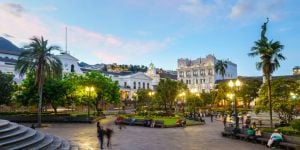 Work in Ecuador
Work in EcuadorEcuador is famous as a retirement haven. But you might not want to wait until retirement age to move there and ...
 Healthcare in Ecuador
Healthcare in EcuadorEcuador, as a fast-developing nation, has laws that are constantly evolving, but one thing is certain: the ongoing ...
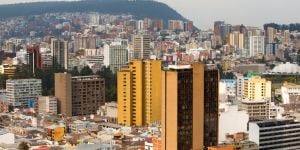 Opening a bank account in Ecuador
Opening a bank account in EcuadorA few years back, an expat would just breeze into an Ecuadorian bank, flash their passport and a bank account ...
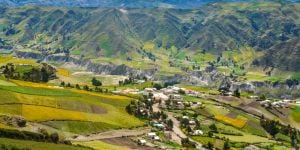 Family and children in Ecuador
Family and children in EcuadorFamily is everything to an Ecuadorian. The extended family unit is the most important aspect of life in Ecuador, ...
 The Working Holiday Visa for Ecuador
The Working Holiday Visa for EcuadorEcuador is truly a paradise for adventure and nature lovers, and thanks to the Working Holiday Visa program, they ...
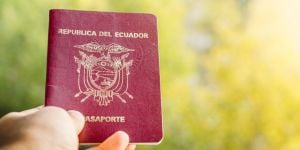 Permanent Residency in Ecuador
Permanent Residency in EcuadorEcuador is calling and you are ready to go and experience all that this gorgeous country has to offer. However, ...
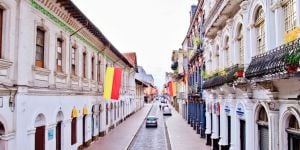 Work in Cuenca
Work in CuencaThere is no doubt that the Spanish colonial city of Cuenca is a wonderful place to call home, as demonstrated by ...
Find more topics on the Ecuador forum



